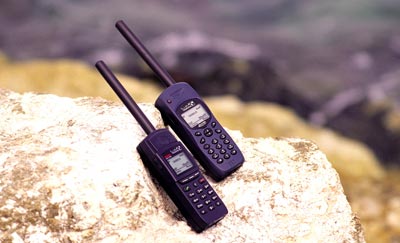Spacepower for warlordsby Taylor Dinerman
|
| While there is no doubt that space technology has helped many developing countries to work their way out of poverty, sometimes space systems can be used in decidedly negative ways. |
These phones seem to have played a role in the so-called “blood diamonds” trade that fueled the wars in Sierra Leone and Liberia. By providing essential communications among the warlords, those who bought the diamonds, and those who sold them the weapons they needed to keep fighting, this technology may have helped to prolong these wars with all the misery that this implies.
In the northwest section of the Indian Ocean, Somali pirates, equipped with satellite phones and GPS, have been increasingly active. According to an AP report published last month (which may or may not be reliable), “They target passenger and cargo vessels for ransom or loot, and use the money to buy weapons.” Other reports indicate that these pirates are operating further and further away from their bases, which shows just how much they depend on space technology for their operational effectiveness. The next step, perhaps, may be to use commercial remote sensing images to help locate vulnerable ships.
This kind of activity contributes to major humanitarian crises: the ongoing situation in Somalia continues due to warlords and their clans. They not only prevent or delay food aid from reaching those who need it, but they also keep things stirred up so that few crops get planted and it becomes almost impossible to maintain the herds of cattle that were once that unhappy nation’s principal resource.
Africa is full of other examples like these. So the question for the US and for other spacefaring nations is, “What, if anything, can be done about this?” The US is not going to shut down or even degrade the GPS signal in that part of the world. Satellite phone operators will find it difficult or impossible to tell which of their instruments are being used by pirates and warlords and which are being used by legitimate merchants or by aid workers. Intelligence organizations are probably hampered, not only by the large number of signals they must try to monitor, but also by their own lack of relevant language skills.
One answer might be to use persistent high altitude UAVs such as the US Global Hawk to jam the frequencies used by these phones across a limited area where the warlords are active. This would be an expensive and temporary solution at best. Far better would be to convince the satellite phone companies to cut off services to areas where their phones are being used for illegitimate purposes.
The question then becomes who is going to ask these companies to make this sacrifice? Ideally it would be the African Union since that organization represents the recognized governments of the continent, but the AU may find itself unable to act since warlords are often acting as surrogates for governments that want to destabilize or weaken their neighbors. Individual states should be able to request that services to parts of their own territory be cut off when those areas are being used as bases to attack the government. These types of requests can be made more effective if the US or a European state, such as France, were to support them.
| The space industry in general and the satellite phone companies in particular should be encouraged to find ways to limit the damage their products can do. |
In some cases there are areas with no recognized government, such as Somalia. Here international humanitarian and human right organizations, as well as international maritime safety and telecommunications organizations, might take it on themselves to pressure the satellite phone companies to cut off service to these areas. In a few exceptional cases they might be able to provide limited services to organizations and individuals with a demonstrated need and only under carefully supervised circumstances.
Extremely poor nations caught in what Professor Collier calls “The Conflict Trap” are going to have a hard enough time trying to escape. The space industry in general and the satellite phone companies in particular should be encouraged to find ways to limit the damage their products can do. Providing advanced global communications systems to warlords who prey on the poorest of the poor is probably a business they neither need nor want.
